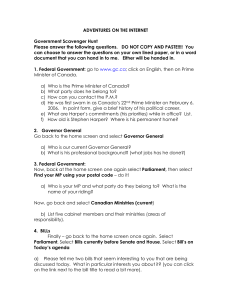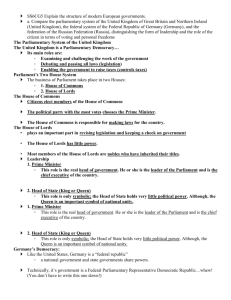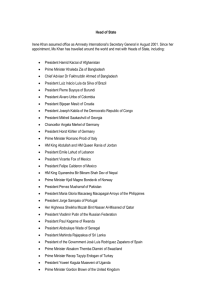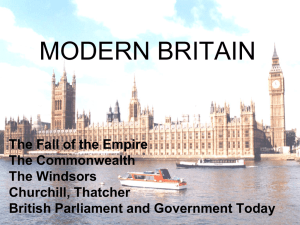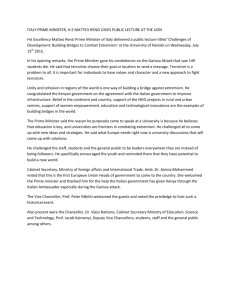COMMITTEE ON THE FORM OF GOVERNMENT HIGHLIGHTS ON
advertisement
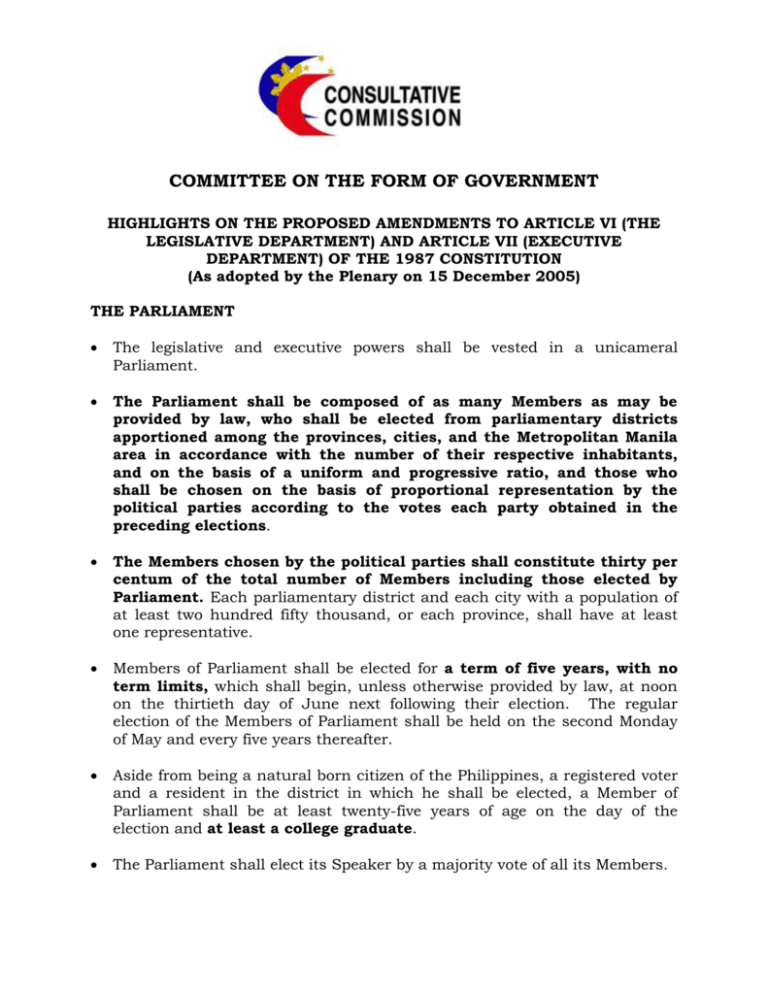
COMMITTEE ON THE FORM OF GOVERNMENT HIGHLIGHTS ON THE PROPOSED AMENDMENTS TO ARTICLE VI (THE LEGISLATIVE DEPARTMENT) AND ARTICLE VII (EXECUTIVE DEPARTMENT) OF THE 1987 CONSTITUTION (As adopted by the Plenary on 15 December 2005) THE PARLIAMENT The legislative and executive powers shall be vested in a unicameral Parliament. The Parliament shall be composed of as many Members as may be provided by law, who shall be elected from parliamentary districts apportioned among the provinces, cities, and the Metropolitan Manila area in accordance with the number of their respective inhabitants, and on the basis of a uniform and progressive ratio, and those who shall be chosen on the basis of proportional representation by the political parties according to the votes each party obtained in the preceding elections. The Members chosen by the political parties shall constitute thirty per centum of the total number of Members including those elected by Parliament. Each parliamentary district and each city with a population of at least two hundred fifty thousand, or each province, shall have at least one representative. Members of Parliament shall be elected for a term of five years, with no term limits, which shall begin, unless otherwise provided by law, at noon on the thirtieth day of June next following their election. The regular election of the Members of Parliament shall be held on the second Monday of May and every five years thereafter. Aside from being a natural born citizen of the Philippines, a registered voter and a resident in the district in which he shall be elected, a Member of Parliament shall be at least twenty-five years of age on the day of the election and at least a college graduate. The Parliament shall elect its Speaker by a majority vote of all its Members. At least one-third of the Members of Parliament shall constitute a quorum to do business but a majority of the Members shall constitute a quorum for voting. The Prime Minister shall submit to the Parliament within thirty days from the opening of each regular session a budget of receipts as the basis of the general appropriations bill. The form, content and manner of preparation of the budget shall be prescribed by law. No treaty or international agreement shall be valid and effective unless concurred in by a majority of all the Members of Parliament. A vote of 2/3 of all the Members of Parliament is required to declare the existence of a state of war. Every bill passed by the Parliament shall, before it becomes a law, be presented to the Prime Minister for his signature. The Parliament may withdraw its confidence from the Prime Minister only by electing a successor by a majority vote of all its Members. The Prime Minister or any Member of the Parliament may request for a popular vote of confidence from the Parliament on fundamental issues or on a general declaration of program or policy. In case the Parliament is dissolved, the President shall call a special election on the date set by the Prime Minister. In the new Parliament, the Members shall serve for a term of five years beginning from the time the Prime Minister convokes the Parliament. In case of dissolution of the Parliament or the termination of its regular term, the incumbent Prime Minister and the Cabinet shall continue to conduct the affairs of government until the new Parliament is convoked by the Prime Minister and a new Prime Minister is elected and qualified. The Commission on Appointments and the Parliament Electoral Tribunal shall be constituted within thirty days after the Parliament shall have been organized with the election of the Speaker. THE PRIME MINISTER AND THE CABINET The Executive Power shall be exercised by the Prime Minister with the assistance of the Cabinet. He or she shall be elected by a majority of all the Members of the Parliament from among themselves. Prime Minister shall appoint the Deputy Prime Minister who shall head a Ministry, and the Members of the Cabinet who shall be the heads of the Ministries, at least three-fourths of whom shall come from the Parliament. They may be removed at the discretion of the Prime Minister. The Prime Minister shall also appoint the career Senior Deputy Minister for each Ministry who shall be a member of the career civil service and shall be the chief administrator of the Ministry. The Prime Minister or any Member of the Cabinet may resign for any cause without vacating his seat in the Parliament. The Prime Minister and the Cabinet shall be responsible to the Parliament for the program of government and shall determine the guidelines of national policy. The Prime Minister shall have control of all ministries, bureaus, and offices. He shall have supervision and administration over autonomous territories, local governments, and all of the armed forces of the Philippines. He shall ensure that the laws be faithfully executed. The Prime Minister shall nominate and, with the consent of the Commission on Appointments, appoint the following: 1. Chief Justice and Members of the Supreme Court and lower collegiate courts, the Ombudsman and his deputies; 2. Chairmen and Members of the Constitutional Commissions, the Chairmen and Members of the independent constitutional bodies, 3. Ambassadors, chiefs of mission and consuls-general, 4. Chief of Staff, the Vice Chief of Staff, Deputy Chief of Staff and the commanders of the major services of the Armed Forces of the Philippines and the officers of the Philippine National Police of equivalent rank and grade, and; 5. All other officers of the Government whose appointments may be subject for confirmation as provided in this constitution or by law. The Prime Minister shall have the power to make appointments during the recess of the Parliament, whether voluntary or compulsory, but such appointments shall be effective only until disapproval by the Commission on Appointments or until the next adjournment of the Parliament. The Prime Minister may contract or guarantee foreign loans on behalf of the Republic of the Philippines with the prior concurrence of the Monetary Board, and subject to such limitations as may be provided by law. THE PRESIDENT The President shall be the Head of State. The President shall be elected from among the Members of the Parliament by a majority of all its Members who must at least be forty years of age on the day of his election and a resident of the Philippines for at least ten years immediately preceding his election. The President shall serve for a term of five years which shall commence from the date he takes his oath of office within three days after his proclamation by the National Assembly, and shall end at twelve noon on the day his successor shall take the same oath. Upon taking his oath, the President shall cease to be a Member of the Parliament and of any political party. Unless otherwise provided in this Constitution, he shall be ineligible to hold any office during his term. The Office of the President shall enjoy fiscal independence. Except in cases of impeachment, or as otherwise provided in this Constitution, the President, upon the recommendation of the Prime Minister, may grant pardon, and, after conviction by final judgment, grant reprieves, commutations, and remit fines and forfeitures. He shall, upon the recommendation of the Prime Minister, have the power to grant amnesty with the concurrence of a majority of all the Members of the Congress. The President shall appoint all officers and employees in his office in accordance with the Civil Service Law. He may perform such other duties and functions of state as may be provided by law. The President and the Prime Minister shall be immune from suit during their tenure.
